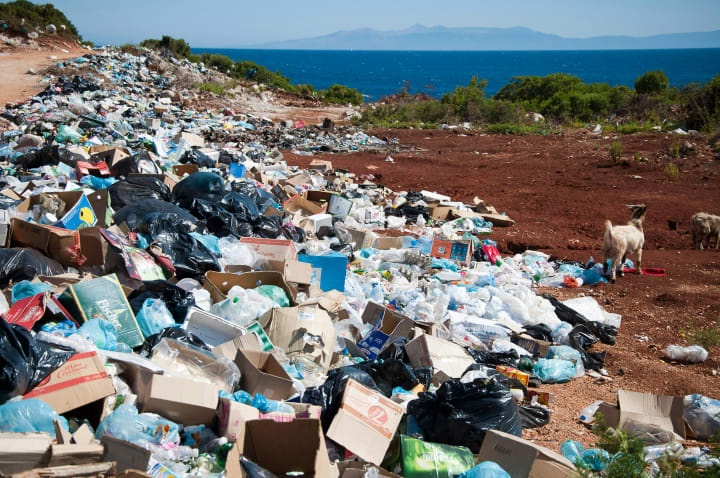Sent earth garbage to The biggest planet of our Solar System
Throw our blue planet wastes spread by the modern world Humans to the the biggest planet of our Solar System

This is a hypothetical thinking that what happens when we send or throw the whole garbage of our beautiful blue planet to the biggest planet in our Solar system.
Introduction:
• Waste management is a pressing global issue due to the growing amount of waste being generated, which poses a threat to the environment and human health.
• With population growth and changing consumption patterns, there is a greater need for innovative waste solutions.
• While various strategies have been suggested on Earth, the concept of sending all waste to Jupiter has sparked debate regarding its feasibility, ethics, and potential consequences.
• This report examines the challenges of waste management, explores the theoretical aspects of transporting waste to Jupiter, and discusses alternative approaches to addressing the waste crisis.
Understanding Earth's Waste Crisis:
• The current waste crisis on Earth is a result of excessive consumption in various sectors, generating massive amounts of waste.
• This includes single-use plastics polluting oceans and e-waste contaminating soil and water with toxic chemicals.
• Before considering transporting waste to Jupiter, it is crucial to comprehend the scale and repercussions of our planet's waste crisis.
The Environmental Toll:
• The untreated waste poses a significant environmental burden, leading to pollution of air, land, and water, jeopardizing ecosystems and human health.
• Landfills release greenhouse gases like methane and carbon dioxide, exacerbating climate change.
• Plastic pollution in oceans harms marine life, disturbs ecosystems, and affects human health through bioaccumulation.
• Improper disposal of hazardous waste also contaminates soil and water, posing risks to nearby communities.
Challenges of Traditional Waste Management:
• Traditional waste management methods such as landfill, incineration and recycling have limitations and drawbacks.
• Landfills require a lot of land and emit greenhouse gases, incineration releases harmful pollutants, and recycling faces logistical challenges and pollution issues.
• These factors contribute to low recycling rates in many regions.
• Alternative waste management solutions are needed to address these issues and reduce environmental impact.
The Case for Innovative Solutions:
• Traditional waste management methods are being recognized as insufficient, leading to a need for innovative and sustainable waste reduction approaches.
• The principles of a circular economy, such as resource efficiency and material recycling, offer a promising framework for changing how goods are produced, consumed, and disposed of.
• Strategies like designing recyclable products and implementing extended producer responsibility systems can help minimize waste and maximize resource use throughout a product's life cycle.
Exploring the Concept of Transporting Waste to Jupiter:
• In light of Earth's waste crisis, the concept of sending all waste to Jupiter is proposed as a thought experiment.
• While not currently feasible, this idea prompts reflection on waste management, space exploration, and environmental attitudes.
• It highlights the need for sustainable solutions to tackle the growing problem of waste on our planet.
Technical Considerations:
• Transporting waste from Earth to Jupiter is a daunting task due to the enormous distances involved and current technology limitations.
• Energy requirements, spacecraft design, propulsion systems, and payload all pose challenges beyond current capabilities.
• The cost of such a project would likely be prohibitive and exceed even ambitious space exploration efforts.
• Overall, the logistics of such a mission present significant technical hurdles.
Environmental Impact Assessment:
• The environmental implications of sending Earth's waste to Jupiter's atmosphere must be carefully considered due to the gas giant's unique composition and turbulent atmosphere.
• Jupiter is mainly made up of hydrogen and helium, with powerful storms, intense radiation, and extreme pressures.
• The entry of Earth's debris into Jupiter could disrupt the atmosphere, leading to changes in weather patterns, atmospheric composition, and chemical reactions with uncertain long-term consequences.
.
Ethical and Legal Implications:
• The ethical and legal issues surrounding the transport of Earth's trash to Jupiter raise questions about who would be involved in such a project, who would authorize it, and the potential ecological consequences.
• Is it ethical to pollute another celestial body with our waste? How would future generations and other civilizations in space perceive this action? These dilemmas emphasize the need to consider the broader impact of our actions, both on Earth and beyond.
Alternative Approaches to Waste Management:
• The concept of transporting Earth's waste to Jupiter is intriguing but unrealistic.
• Practical solutions to manage our waste crisis should focus on sustainable development, justice, and environmental protection.
• Rather than sending waste to other planets, efforts should be directed towards reducing waste, enhancing resource efficiency, and implementing effective waste management strategies on Earth.
Investing in Waste Reduction and Recycling:
• Investing in waste reduction and expanding recycling infrastructure is crucial in addressing the waste crisis.
• Promoting waste minimization, designing recyclable products, and enhancing collection systems can lessen the strain on landfills and preserve resources.
• Public awareness campaigns and policy measures are key in advocating for waste reduction and recycling practices.
Advancing Circular Economy Practices:
• Embracing circular economy principles involves keeping materials in circulation for as long as possible through reuse, repair, and recycling.
• This approach promotes environmental sustainability, economic flexibility, and social equity by closing source flow chains and reducing waste production.
• Collaboration between governments, businesses, and civil society is essential to accelerate the transition to a circular economy model and address the waste crisis effectively.
Harnessing Technology and Innovation:
• Technology and innovation are revolutionizing waste management by offering new ways to utilize resources and turn waste into valuable products.
• Advanced recycling technologies and decentralized waste management are just a few examples of innovative solutions that can address waste issues from various angles.
• Research and development efforts should focus on enhancing these technologies, lowering costs, and fostering collaboration among stakeholders from different sectors.
Fostering Global Collaboration and Partnerships:
• Collaboration and international cooperation are essential in addressing the waste crisis.
• Sharing best practices and working together on research and development projects can help countries improve their waste management systems.
• Multilateral agreements like the Basel Convention are important in regulating international waste trade and preventing illegal dumping in developing nations.

Conclusion:
• focus on long-term solutions to reduce waste and protect our planet.
• It is important to prioritize practical and achievable strategies that can make a real difference in addressing the global waste crisis.
• Through collaboration and commitment to sustainable practices, we can work towards a cleaner and healthier future for our planet and future generations.





Comments
There are no comments for this story
Be the first to respond and start the conversation.